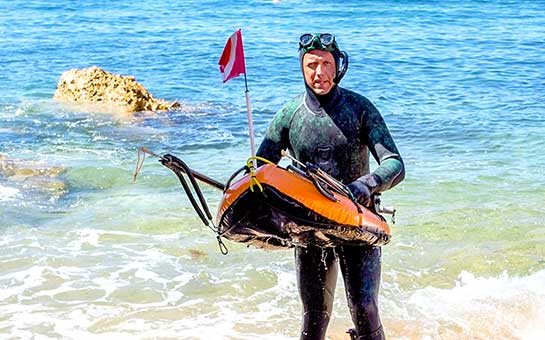Who said you can’t shoot an arrow underwater? That person must not be familiar with spearguns. Imagine diving into the water and using what looks like a crossbow to catch fish. Fun right? Spearfishing is an extreme sport and requires practice to hit the fish where it counts. Since it is an extreme sport, getting travel insurance for spearfishing is crucial.
Travel Insurance for Spearfishing
A spearfishing travel insurance plan comes under three basic categories: 1) hazardous sports travel insurance, 2) adventure sports travel insurance, 3) extreme sports travel insurance.
Check the fine print of the insurance plan before you buy and see if it has coverage for spearfishing as most travel insurance plans don’t offer coverage for spearfishing. Some do offer it as an add-on. If your insurance plan does not offer travel insurance for spearfishing, you will need to get a plan that does. Contact us if you have questions or need assistance finding the best travel insurance for spearfishing.
Spearfishing Basics
Spearfishing involves two things, freediving and fishing. Divers use a speargun to fish. Spearguns come in different shapes and sizes, some can be as long as 1.5 meters. These guns have powerful rubber bands attached to them. Divers stretch these rubber bands and attach them to notches. They use them to propel the spear, so the bigger the gun, the more powerful the shot.
Beginners must not go spearfishing without a guide. Spearfishing divers are freedivers; which is breath-hold diving without any additional equipment. Freediving coupled with spearfishing makes this difficult. So, experience in this field is very important, so much so that even experienced divers can feel fatigued and need to rest.
The various spearfishing equipment every freediver must carry are spearguns, spearfishing spear, wetsuits, rash guards, masks, snorkel, gloves, freediving fins, weight belt, and a dive computer. Divers must ensure they carry these things for their safety. Every piece of equipment is important.
Spearfishing divers can go up to 25 meters deep in search of fish. These depths add strain on the body. Since spearfishing is much like hunting with a crossbow, divers must maintain their calm and breathe normally. This will keep them safe and in control. Beginners can panic and this is why guides are important.
Risks of Spearfishing
Spearfishing is dangerous, even the experts say so. While entering into the water off the shore, even the entry and exit points that you pick are important. Choose the wrong entry or exit spot during the wrong time of the day and the results are fatal.
You especially need to be careful during the high surf. Trying to go spearfishing during a high surf can lead to divers getting pushed against rocks causing injury. Moreover, you can even get injured by the spears and can also get cramps.
Riptides are another threat that can lead to danger. Additionally, beginner divers must learn pressure equalization techniques otherwise the water pressure can lead to permanent ear damage.
Drowning is another serious concern. Since spearfishers are freedivers that have learned to hold their breath for longer durations that most people can. At times, shallow water blackouts could lead to drowning.
Another unfortunate but real risk that you will have to deal with is getting accidentally pierced by a spear shot by someone else. It is painful and the ensuing blood makes it risky.
Sharks are also a threat while spearfishing. Blood attracts sharks and when you hit a fish with a spear it bleeds.
These risks are clear indications as to why one needs a spearfishing travel insurance plan. With your potential medical needs covered, you can focus on staying safe when you go spearfishing and not worrying about the cost of medical treatment.

